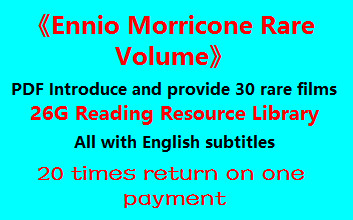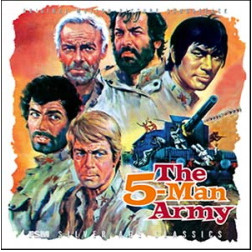UN ESERCITO DI 5 UOMINI [THE FIVE MAN ARMY] (1969)
Un Esercito di 5 Uomini – The Five Man Army – is an Italian-made action thriller set in Mexico during the Revolutionary War. A gang of Mexican rebels hire ‘the Dutchman’ and his gang to rob a train carrying $500,000 in gold, which the rebels intend to use to fund their uprising. However, after successfully carrying out the raid (in an impressively staged action set pieces), tensions arise within the gang as they decide whether or not to keep their promise to the revolutionaries, or keep the gold for themselves. The film was directed by Don Taylor – a former character actor who would later go on to make such films as Escape from the Planet of the Apes, Damien: Omen II, and The Final Countdown – was co-written by Dario Argento, and starred Peter Graves, James Daly, Bud Spencer, Nino Castelnuovo, and Tetsuro Tamba as the members of the five-man army itself.
As is usually the case for Morricone spaghetti western scores, the whole thing built around a brilliant but idiosyncratic main theme, and that is certainly the case here. The “Main Title” offers a driving piece that pairs guitars, woodwinds, and thunderous strings, into which are inserted an anarchic, array of bizarre choral outbursts and sound effects. There are prominent restatements of the theme in later cues such as “The Chicken Farm/The Mining Colony,” The Circus/To Morales,” “Maria’s Goodbye/Pursuit,” “Departure/Army in Disguise/Underneath the Train,” and the terrific and joyously rousing “Success”.
A secondary theme called ‘Muerte Donde Vas?’ appears in several cues, and is a much darker and more serious lament on life and death, and has several important statements, notably “The Execution” when it is heard in as a funereal choral lament, and then in “The Journey” where the melody is carried by soulful woodwinds and muted brass. The friendship theme for the men of the Army, called ‘A Cinque Amici, Cinque Eroi,’ is just gorgeous, a florid but slightly bittersweet piece for strings and oboes that first appears in the beautiful “Introductions,” and then receives especially notable statements later in “Interrogation/Captured” and the emotional “Already Dead”.
Elsewhere there are moments of tension and comedy – notably a dissonant suspense motif called ‘Contro il Tempo’ which received its best statement in “Out of Time” – as well as some rich guitar writing in “Flowers and Food”, and finally a heroic theme for brass and sweeping strings which receives a rousing statement in “The Train”. Finally, the score’s spectacular action highlight is “Samurai Runs,” a thrilling and turbulent piece for strings, electric guitars, frantic percussion, xylophones, voices, and howling brasses and woodwinds that rampage through the orchestra like things possessed, fast-paced and anarchic and quite brilliant.
Un Esercito di 5 Uomini is one of Ennio Morricone’s best non-Leone western, and fans of his work in the genre will want to add this title to their playlist without delay. The score has had several releases over the years, but the most comprehensive one is the one released by Film Score Monthly in 2009 as part of their Silver Age Classics series, and includes the complete score re-mastered and in chronological order, plus a number of bonus cues.
Track Listing: 1. Main Title (2:53), 2. The Chicken Farm/The Mining Colony (2:04), 3. The Circus/To Morales (2:42), 4. The Execution) (2:32), 5. Flowers and Food (1:17), 6. Introductions (2:18), 7. The Journey (2:49), 8. Interrogation/Captured (1:46), 9. Escape (3:31), 10. Maria’s Goodbye/Pursuit (2:13), 11. Rebel Aid (1:23), 12. The Train (0:33), 13. Ambushing the Truck (0:12), 14. To the Station House (0:42), 15. Already Dead (2:17), 16. Departure/Army in Disguise/Underneath the Train (1:57), 17. Close Call/The First Move/The Next Move (2:51), 18. Samurai Runs (4:14), 19. Surprise Guests/Mesito Prepares (0:58), 20. Out of Time (4:25), 21. Success (1:02), 22. The Dutchman’s Cause (2:44), 23. New Recruits (4:59), 24. Un Esercito di Cinque Uomini (Main Title) (2:54) BONUS, 25. Muerte Donde Vas? (Album Track) (4:11) BONUS. Film Score Monthly FSMCD-12-16, 59 minutes 27 seconds.












